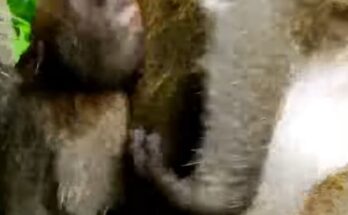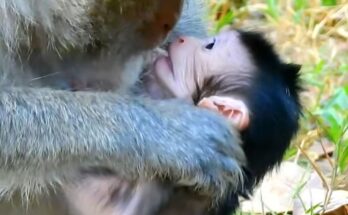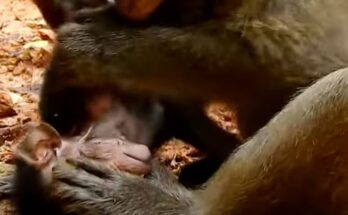In the verdant forests of South Asia, a remarkable scene unfolds as Mother Jenny, a caring female grey langoor, shares the joy of her newborn, Baby Max, with other members of the troop. This practice of communal caregiving, where baby monkeys are shared and play with each other, is a heartwarming testament to the strong social bonds and cooperative nature of langoor societies.
From the moment Baby Max was born, he has been the center of attention within the troop. Jenny, his devoted mother, ensures his safety and well-being, but she also understands the importance of social interaction for his development. Allowing other troop members to play with and care for Baby Max helps strengthen the communal bonds and teaches him essential social skills.
The scene of Baby Max being passed around among the troop is both endearing and fascinating. Older females, who have experience in raising their own offspring, take turns holding and grooming him. This communal care, often referred to as “alloparenting,” provides Baby Max with additional warmth, comfort, and social learning opportunities. The gentle touches and playful interactions he receives from his extended family help him become accustomed to various social cues and behaviors.
Juvenile langoors, full of energy and curiosity, are particularly eager to interact with Baby Max. They play gently with him, under the watchful eyes of their mothers and other adults. These play sessions are crucial for Baby Max’s physical and cognitive development, as they help him improve his coordination, strength, and problem-solving skills. The playful antics of the young langoors also provide entertainment and joy to the entire troop, reinforcing their bonds.
Male langoors, including the dominant alpha, also participate in this communal caregiving. Their involvement is a sign of their protective instincts and their role in the social structure. By allowing Baby Max to interact with them, they help integrate him into the troop’s hierarchy, teaching him respect and trust.
Jenny’s decision to share Baby Max with the troop is a strategic one. It not only ensures that he receives diverse care and attention but also allows Jenny to take brief breaks to forage and rest, knowing that her baby is in safe hands. This shared responsibility reflects the cooperative nature of langoor society, where the well-being of each member is intertwined with the health of the entire group.
Witnessing the troop’s communal care for Baby Max is a touching reminder of the importance of community and cooperation in the animal kingdom. It showcases the deep connections and mutual support that define langoor society, highlighting how these intelligent and social animals work together to nurture and protect their young. Through these shared experiences, Baby Max learns the values of trust, cooperation, and social harmony, preparing him for a future as a well-integrated member of the troop.


